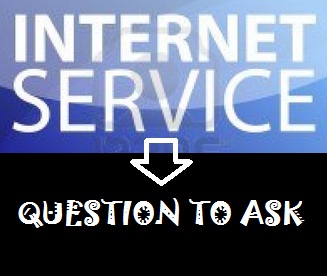While your Internet Service Provider (ISP) may give you a pamphlet with a rundown of the services you intend on purchasing, there are plenty of things that they won’t tell you unless you ask them. Because most people don’t bother to ask these important questions, ISPs often get away with seemingly unfair practices and are able to charge customers for services that they aren’t actually receiving. To ensure that you aren’t getting cheated by your ISP, ask them the following questions before purchasing any services.
1. How Many People In My Neighborhood Are On Your Network?
This question is important because it will impact the amount of bandwidth you receive. The term “bandwidth” refers to the transfer of data in either direction, from your home network to your ISP or from your ISP to your home network. Bandwidth is shared by the total number of customers that an ISP has, but is specifically divided up among the amount of customers in a specific area. Depending on the number of customers that your ISP has in your local area, your Internet speeds may be lower or higher.
2. Does Your Exchange Point Often Become Clogged?
While bandwidth is divided up among the customers your ISP has in your area, data across the entire network must be shared with other ISPs when you send a file to someone who has a different ISP. To do this, your ISP uses a physical switching device called an “exchange point” to share data with other ISPs. While data within your ISPs network may be shared very fast, your Internet speed may slow down when sharing data with other networks of many customers are doing so at the same time.
3. What Are The Real-World Bandwidth Limits I Can Expect?
Because your Internet speed is dependent on your bandwidth, these factors can slow your total Internet speeds down significantly as compared to what they are advertised to be. Likewise, most ISPs artificially limit the bandwidth of their customers so that they can charge varying rates for higher amounts of bandwidth. Despite what your ISPs advertisements claim, ask your ISP how fast your Internet will really be in your area?
4. What Times Are Burst Speeds Available?
While ISPs usually artificially limit the amount of bandwidth that customers have access to, known as “bandwidth capping”, there may be times in which your bandwidth is much higher due to lower amounts of traffic. For example, your bandwidth may be 2-3 MB/s between 3:00 AM – 5:00 AM on a Wednesday morning, but only 1 – 1.5 MB/s on a Saturday afternoon. Ask your ISP when the bandwidth peak times are and try to get a report of those times if you can.
5. Can I Have A Report Of Your Rate Increases?
Because ISPs are able to change their pricing structure without warning at any time, they often raise their rates slowly over time so that customers don’t notice. To ensure that you’re not about to purchase your service from a company that cheats its customers, ask them for a report of their annual rate increases. If you they don’t give it to you, try looking online to see what other people have to say or find their fiscal reports in the public records.



